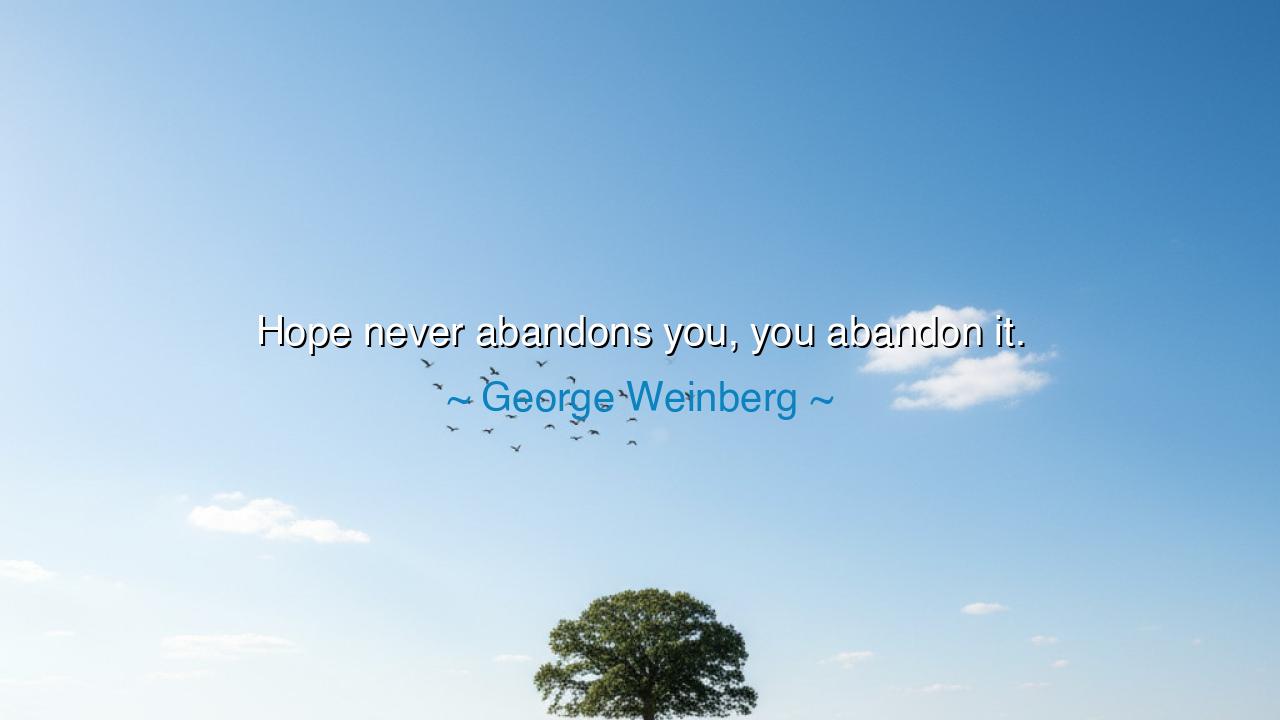
Hope never abandons you, you abandon it.






“Hope never abandons you, you abandon it.” Thus spoke George Weinberg, the psychologist and philosopher of the human spirit, whose words pierce like sunlight through the shadows of despair. In this simple yet profound statement lies a truth as ancient as humankind itself: that hope is not a fragile thing to be found or lost in the world—it is a power that dwells within us, constant as the breath, awaiting our faith to awaken it. It is not hope that flees in times of hardship; it is we who turn away from it, blinded by our pain, forgetting that it stands faithfully beside us, patient and eternal.
Weinberg’s words were born from a deep understanding of the mind and the soul. As a psychotherapist, he saw countless souls broken by fear, loss, and failure—people who believed that hope had deserted them, that the light had gone out of their lives. But he knew better. He saw that hope was never gone—it was only buried, buried beneath layers of disappointment and despair. He sought to remind them that hope is a choice, a quiet act of courage repeated daily. It is not an external gift that comes to us by chance, but an inner fire that must be tended, especially in the coldest hours.
The ancients, too, knew this truth. In the myth of Pandora’s box, when all the world’s evils—sickness, sorrow, and strife—were released upon mankind, one thing remained at the bottom: Hope. The gods allowed it to stay, not as a consolation, but as a promise—that no matter how dark the world became, the flame of hope would never be extinguished unless man himself smothered it. Hope was not a gift meant to protect us from pain, but a companion meant to give us strength through it. So when Weinberg said that we abandon hope, he echoed the voice of this ancient wisdom: Hope is immortal, but it requires your faith to live.
History bears witness to this power. Consider Nelson Mandela, imprisoned for twenty-seven years in a cell no larger than a walk-in closet. Stripped of freedom, separated from his family, and condemned by injustice, he could have surrendered to despair. Yet he did not. He once said, “I am fundamentally an optimist... I cannot help it.” In his heart, hope never left him, because he refused to abandon it. When he was released, that same hope built bridges between enemies and healed the wounds of a nation. His life stands as proof that hope is not dependent on circumstance—it is a choice of the spirit, a rebellion against surrender.
In contrast, many who walk among us today believe that hope has betrayed them when life turns cruel. But Weinberg teaches us that the betrayal lies within ourselves. We are quick to give up, to close the door of the heart when storms rage. Yet hope knocks even then—it waits, as patient as the dawn. When we abandon it, we drift into cynicism, believing there is no purpose or future. But when we return to it, even the smallest spark can reignite the will to rise, to rebuild, to love again. The one who holds to hope, even in ruin, is like a tree that bends but does not break beneath the wind.
This quote is not a mere comfort; it is a call to responsibility. Hope is not passive—it demands participation. To keep hope alive, we must act. We must speak words of encouragement when silence tempts despair. We must nurture gratitude when the world seems barren. We must look for meaning even in suffering. For every step toward hope, no matter how small, is a step toward life itself. As the farmer must water his fields even when rain is distant, so must we nourish hope even when outcomes are uncertain.
So, my listener, take this teaching into your heart: Hope will never forsake you. It is not the world’s gift to you—it is your gift to yourself. When grief overwhelms, when failure burns, when loneliness whispers that all is lost, do not believe that hope is gone. It is there, waiting quietly beneath your pain, ready to rise if you call it by name. Return to it. Speak to it. Hold it as the traveler holds the last ember of his fire through the cold night. For as long as you keep it alive, no darkness can claim you.
Thus, remember the wisdom of George Weinberg: that hope never abandons you—you abandon it. Let this truth be a lantern on your path. Do not curse the darkness for being long; instead, remember that the flame was always within you. And when the storms of life howl around you, do not flee from hope—cling to it, for it is the one companion that never leaves, the one force that turns endurance into triumph, and despair into the seed of renewal.






AAdministratorAdministrator
Welcome, honored guests. Please leave a comment, we will respond soon